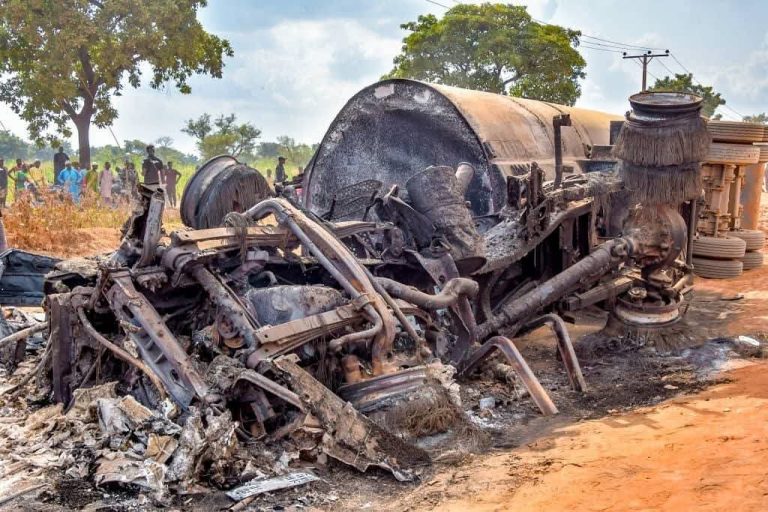From Dikko to Bida, the same tragedy repeats – bad roads, broken systems, and human choices that turn accidents into infernos. Each tanker explosion leaves behind charred bodies and broken families – yet the cycle continues, fed by bad roads, desperation, and a failure to learn from the past.
The acrid smell of burnt rubber and charred bodies still lingers over the scorched stretch of the Bida-Badegi-Agaie road, a grim testament to yet another preventable catastrophe in Niger State’s long history of tanker explosions.
The sequence of events on the afternoon of October 21 was eerily predictable. The tanker, reportedly en route from Lagos to the North, lost control on the dilapidated road, overturning and spilling its volatile cargo. Eyewitnesses described a chaotic scene, ignoring frantic warnings of people.
What followed was not just an accident, but a human tragedy amplified by desperation: residents, villagers armed with jerrycans, buckets, and even plastic bags swarmed the site, drawn like moths to a flame, and rushed to scoop the spilling fuel.
“They were shouting, ‘God has provided!’ as they filled their containers,” recounted Musa Ibrahim, a survivor who lost his brother in the blaze. Minutes later, a spark ignited the fuel vapors, turning the roadside into a fireball that engulfed people, motorcycles and livestock, claiming about 45 lives and injuring over 60 others, according to updates from the National Emergency Management Agency (NEMA) and the Federal Road Safety Corps (FRSC).
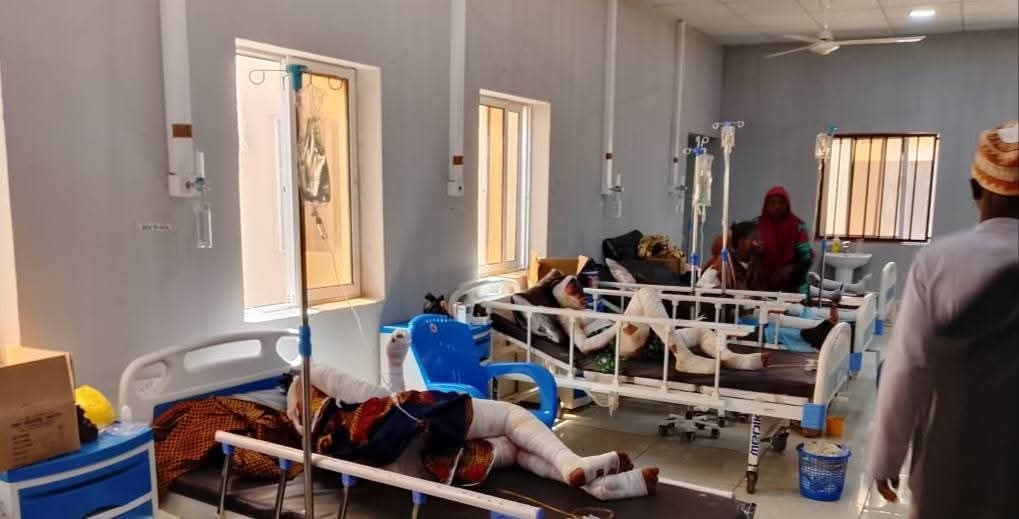
The victims, mostly youths from nearby communities, were not passive bystanders as they became active participants in their own demise. It was gathered that a tanker filled with groundnut oil had fallen along the same spot two days before and the residents of the community counted their luck as they proceeded on scooping the oil to their various residences.
Several of the victims who are injured and receiving treatment at the Federal Medical Centre in Bida were not willing to talk about the incident when the health team delegated by the state government visited them.
Read Also: NEMSAS disburses ₦487m to support emergency health services
One of them, Mohammed Dauda who secured burns in his legs and still in pain explained that he thought it was another tanker that was transporting groundnut oil that had fallen stressing that if he had known that it was a fuel tanker, he would not have approached there.
Dauda stated that he did not scoop any fuel but was among those telling people to stop scooping the fuel. He explained that the explosion was caused when a man tried to use his lighter and in the struggle to take the lighter from him, he threw the lighter in the fuel which ignited causing the fire.
“What happened was a misfortune. A tanker crashed and we went there. But what we first heard was that it was a tanker transporting groundnut oil. If i knew it was fuel, I won’t go. When we got there and discovered that it was petrol, I was one of the people who kept telling those that went to scoop the fuel that it is not advisable to do so. I told them to use plastic containers instead.
“I was still saying that when I noticed a Hausa man standing there trying to use a lighter. A lot of people started struggling with him. He threw the lighter and the tanker caught fire. I only heard the sound of the explosion and the fire threw me across the road. My leg caught fire in the process. Same thing happened with this person close to me, there are also three other children. There are more than thirty others who died around me that day.
“I recently confirmed that the number has scaled up to 40, five people from a village near ours. This is my first time going to an accident scene to scoop fuel”, he defended himself.
This incident, the latest in a string of similar disasters in Niger State, underscores a harsh reality: these explosions are not inevitable acts of fate, but often self-inflicted wounds. If the crowds had resisted the temptation to harvest free fuel from the overturned vehicle, there might have been no explosion at all.
As one elder in Esa community who gave his name as Ndagi Mohammed put it during the somber mass burial the following day, “The tanker fell, but it was their greed that lit the match. If no one was there when it exploded, no one would have died”
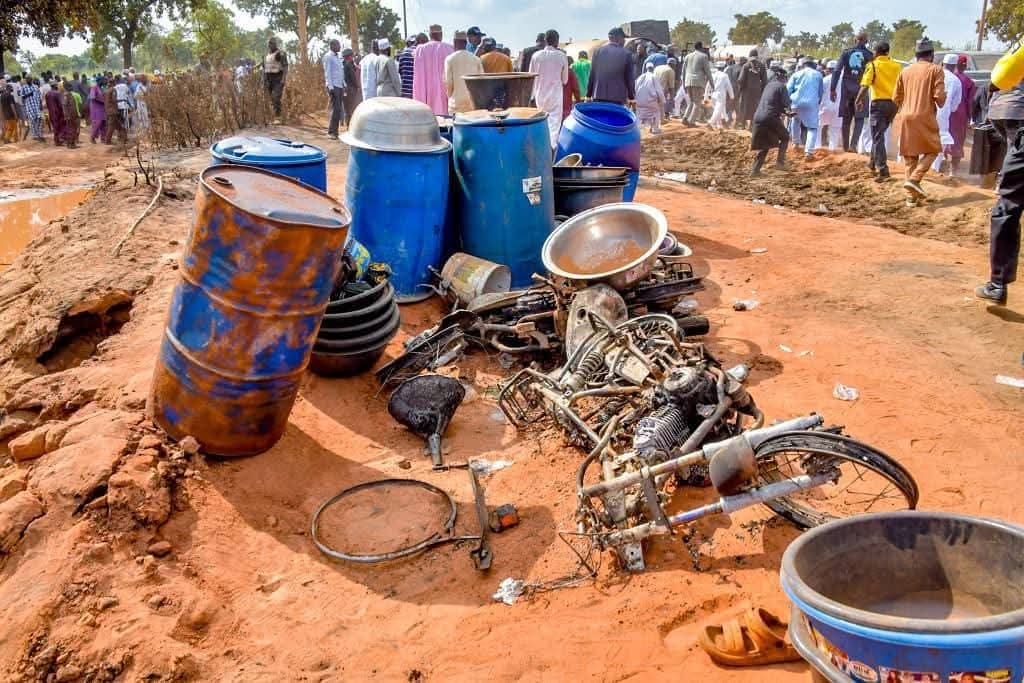
Yet, as Nigeria grapples with soaring fuel prices and economic hardship, such rational pleas fall on deaf ears.
Among the deceased were entire families, including eight relatives from one household, as shared in a heart-wrenching account by a grieving survivor.
A community leader in Essa, Muhammad Kudu disclosed that they tried to stop the people from going to scoop the fuel but all restriction calls fell on deaf ears, “because of the way the road is bad, accidents always happen. Tankers and trailers always fall and whenever they do, you will see people rushing out to take what they can take, no matter how you try to stop them, they pay no heed.”
The Village Head of Essa, Alhaji Adamu Bagudu said that his younger brother lost his two wives and two children in the tragedy adding that at his residence, 24 of the victims were given a mass burial on Tuesday, while four others who died at the Federal Medical Centre (FMC), Bida, were buried on Wednesday morning.
He disclosed that over 90 percent of the victims were women, adding that some travellers were also caught in the inferno, “Of these, 24 were women, while the remaining four were two men and two children. Some of the victims were travellers passing through, including two people on a motorcycle. Others were returning from their farms and had nothing to do with scooping fuel.
“I have been sensitising and educating my people about the dangers of scooping fuel for the past three years. I have cited several examples, including the one that happened in Dikko. Even the DPO of Katcha Police Division is aware of my efforts to discourage this dangerous habit.”
He recalled that on September 9, 2024, a similar tanker explosion occurred just a few kilometres from the village, killing 61 people, 54 cows, 17 goats, and burning seven motorcycles.
“I even invited some residents to the scene so they could see the devastation firsthand and warn others,” he added.
Speaking of Tuesday’s explosion, the village head said he believes the tragedy will serve as a lasting warning to the people in the community.
Bagudu appealed to the federal government to urgently reconstruct the Agaie-Bida road to prevent further loss of lives and property.
The Niger State government swiftly organized a mass burial and pledged free medical treatment for the survivors, led by a team under Dr. Murtala Muhammad Bagana after he had directed that all the injured should be transferred to Gwagalada Specialist Hospital, Abuja for intensive care.
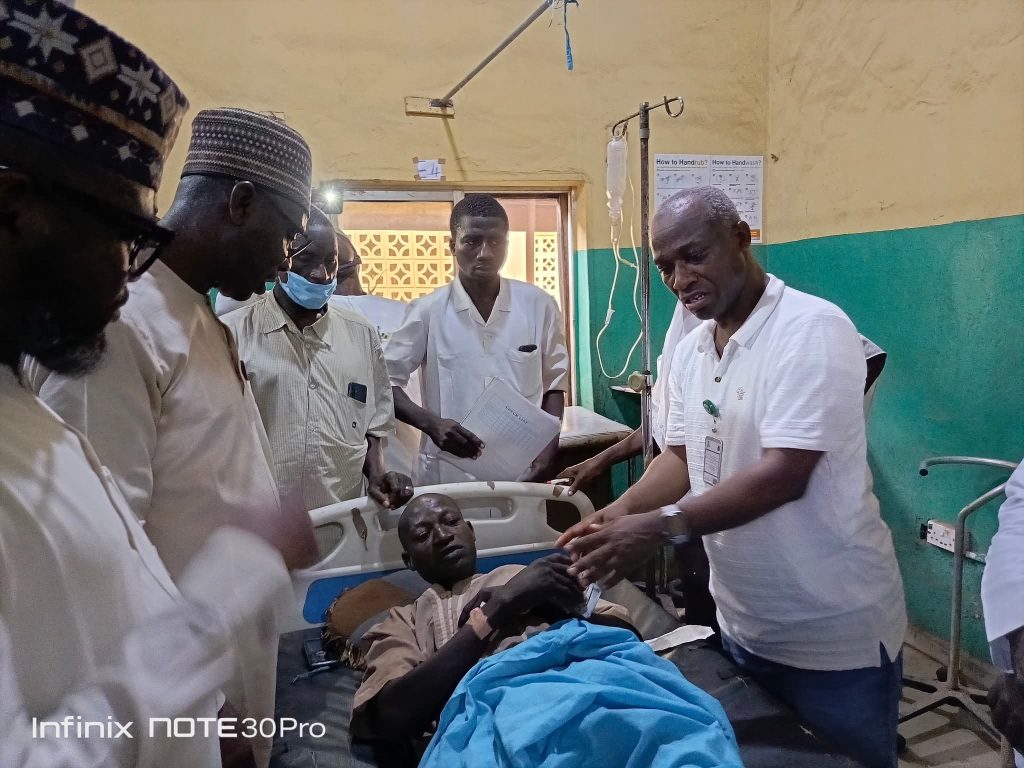
When the Governor, Mohammed Umaru Bago personally visited the community, he frowned at the attitude of people rushing to scoop content from a fallen tanker, saying that the government will not condone such acts anymore.
“We came here to commiserate with them over the loss of lives and to also talk to their conscience. It is a terrible thing that a truck will fall and the people of the community will carry containers to scoop. It is theft and must be addressed as such, and we can’t condone or encourage it,” he stressed.
He acknowledged that the roads are bad, but stated that people should not see it as an avenue to do wrong; rather, when a truck or trailer falls, they should make efforts to rescue the driver and other passengers.
Commiserating with the people over the loss of their loved ones and the quick recovery of the injured, the Governor announced a donation of N1 million to families of each of the deceased victims and N500,000 to each of the injured victims receiving treatment.
Chairman of Katcha Local Government Council, Zubairu Mohammed Essa, described the assistance the state government has been rendering to victims of the disaster as tremendous, especially the free medical services, and that the people of Katcha remain very grateful for the gesture.
But this is no isolated event.
Niger State, a key transit hub for fuel tankers plying the North-Central corridor, has become synonymous with such infernos. Just earlier this year, in January 2025, another tanker explosion occurred at Dikko Junction which claimed lives, with bad roads cited as a primary culprit while in September 2024, another tanker explosion occurred just a few kilometres from the village, killing 61 people, 54 cows, 17 goats, and burning seven motorcycles.
Over the years, similar incidents have dotted the state’s highways, from the Minna-Suleja road to the Lapai axis, often following the same script: a vehicle mishap, spilled fuel, opportunistic scavenging, and then, boom. A report from the Federal Road Safety Corps (FRSC) highlights that Nigeria records dozens of tanker accidents annually, many escalating into explosions due to human intervention.
Critics, including members of the House of Representatives, have lambasted the federal government for the “deplorable condition” of roads like the Bida-Agaie-Lapai-Lambata highway, arguing that poor infrastructure sets the stage for these disasters.
Residents echo this, blaming potholes and narrow lanes for the initial overturns. Yet, as valid as these grievances are, they sidestep a crucial truth: the tanker might overturn, but without the crowds descending to siphon fuel, the risk of explosion plummets. Fuel tankers are designed with safety valves and compartments to contain spills; it is the tampering and proximity of people that turns a spill into a slaughter.
The Victims as culprits: A controversial lens
In the aftermath, a chorus of voices, from government officials to social media commentators, has zeroed in on this victim-blaming narrative, albeit with varying degrees of sensitivity. Lanre Issa-Onilu, Director-General of the National Orientation Agency (NOA), minced no words: the explosion stemmed not from ignorance but from a “failure of community leadership and a breakdown of societal values.”
He argued that locals know the dangers but choose to ignore them, driven by poverty and a culture of opportunism.
On social media platform X (formerly Twitter), the conversation is raw and unfiltered. User @usmanlade shared a video of the chaos, lamenting, “We should always prioritize our safety over risking our precious lives in exchange for ‘dangerous gains.”
Another post from @ppjkis warned, “As soon as one crashes, they are overwhelmed with locals trying to get free fuel. But they are time bombs waiting to explode, it is best to stay far away.”
These sentiments resonate with a broader online consensus: poverty fuels recklessness, but personal responsibility is key.
Experts concur. In a Conversation Africa article, analysts noted that fuel tanker accidents are preventable through “restructuring the built environment, providing parking spaces for tankers,” and stricter enforcement. But they also stress public education: campaigns warning against scooping fuel have been ongoing, yet ineffective amid economic woes. Fuel prices have skyrocketed post-subsidy removal, making spilled petrol a literal goldmine for the impoverished.
Historical Context: A State plagued by flames
Niger State’s tanker woes are emblematic of Nigeria’s broader petroleum transport crisis. With over 5,000 tankers on roads daily, accidents are rampant, FRSC data shows hundreds yearly, many in transit states like Niger.
Past explosions include the 2018 Odukpani incident in Cross River (12 dead) and the 2020 Kogi blast (23 dead), but Niger’s frequency stands out due to its highways’ poor state. A YouTube analysis titled “How To Avert Incessant Tanker Explosion In Nigeria” called for better driver training and vehicle maintenance, but again, emphasized avoiding spill sites.
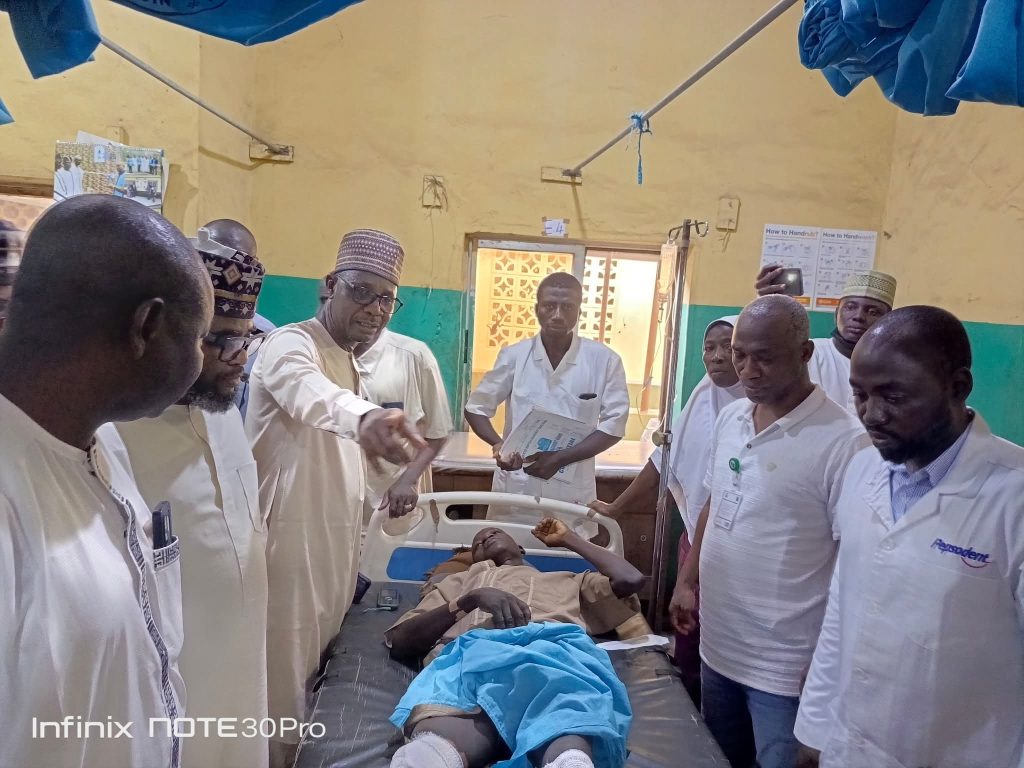
Global Rights, an advocacy group, condemned the latest blast, urging “immediate preventive action” like road repairs and community sensitization.
On Facebook, a post from Prevention of Fuel Tanker Explosions in Nigeria referenced President Bola Tinubu’s directive for traffic rule enforcement to curb such incidents. Yet, enforcement remains weak; tankers often overload or speed, but the real escalation happens post-accident.
Breaking the Cycle: A call to action
As Niger State buries its dead, the question looms: how many more must perish before change? The victims’ role in these tragedies is undeniable, scooping fuel is not survival, but suicide. Yet, blaming them alone ignores the poverty trap set by failed policies.
True mitigation demands a multi-pronged assault: fix the roads, enforce regulations, educate communities, and diversify transport.
Nigeria’s highways should be lifelines, not death traps. Until citizens and leaders alike prioritize safety over shortcuts, the flames will keep claiming lives.


